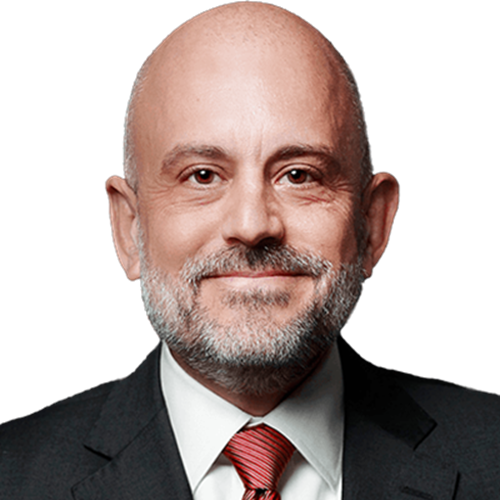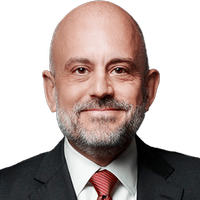Longevity: The Retirement Problem No One Is Discussing
Many people saving for retirement fail to take into account how living longer will affect how much they’ll need once they stop working. What should they do?

Profit and prosper with the best of Kiplinger's advice on investing, taxes, retirement, personal finance and much more. Delivered daily. Enter your email in the box and click Sign Me Up.
You are now subscribed
Your newsletter sign-up was successful
Want to add more newsletters?

Delivered daily
Kiplinger Today
Profit and prosper with the best of Kiplinger's advice on investing, taxes, retirement, personal finance and much more delivered daily. Smart money moves start here.

Sent five days a week
Kiplinger A Step Ahead
Get practical help to make better financial decisions in your everyday life, from spending to savings on top deals.

Delivered daily
Kiplinger Closing Bell
Get today's biggest financial and investing headlines delivered to your inbox every day the U.S. stock market is open.

Sent twice a week
Kiplinger Adviser Intel
Financial pros across the country share best practices and fresh tactics to preserve and grow your wealth.

Delivered weekly
Kiplinger Tax Tips
Trim your federal and state tax bills with practical tax-planning and tax-cutting strategies.

Sent twice a week
Kiplinger Retirement Tips
Your twice-a-week guide to planning and enjoying a financially secure and richly rewarding retirement

Sent bimonthly.
Kiplinger Adviser Angle
Insights for advisers, wealth managers and other financial professionals.

Sent twice a week
Kiplinger Investing Weekly
Your twice-a-week roundup of promising stocks, funds, companies and industries you should consider, ones you should avoid, and why.

Sent weekly for six weeks
Kiplinger Invest for Retirement
Your step-by-step six-part series on how to invest for retirement, from devising a successful strategy to exactly which investments to choose.
Retirement is a major financial milestone for many individuals. However, there is a significant blind spot that many people have when it comes to retirement planning, which is the potential for living longer in retirement than they worked.
In the past, we have seen people retire at age 65 and live for another 10 to 15 years. However, with the advancements in longevity science, people are living longer, and the idea of living 15 years or more in retirement is — in my opinion — underestimated.
According to a 2019 study by the Centers for Disease Control, a 65-year-old man today can expect to live, on average, until age 76, while a 65-year-old woman can expect to live until age 81. However, these numbers are just averages, and many people will live well into their 90s or even beyond. In fact, according to a 2016 PEW Research study, the number of people living to 100 years old is increasing rapidly.
From just $107.88 $24.99 for Kiplinger Personal Finance
Become a smarter, better informed investor. Subscribe from just $107.88 $24.99, plus get up to 4 Special Issues

Sign up for Kiplinger’s Free Newsletters
Profit and prosper with the best of expert advice on investing, taxes, retirement, personal finance and more - straight to your e-mail.
Profit and prosper with the best of expert advice - straight to your e-mail.
What Should People Do to Plan for Longevity?
This increased life expectancy means that people will necessarily need to save more money for retirement, and the money they have will need to be preserved to help avoid running out of money.
With people living longer than ever, I feel that it is entirely possible to be retired for as many years as you worked. Consider this: You begin working at age 20, work for 40 years until age 60, retire and live to age 100. That is 80 years of an increasing income need with you quitting midway through to retire and begin relying on your assets to sustain you.
There are many variables that go into creating streams of income in retirement while protecting that source of income. It can be challenging, especially given the unpredictable and volatile nature of the stock market.
According to the 2019 Retirement Confidence Survey conducted by the Employee Benefit Research Institute (EBRI), more than half of American households are at risk of running out of money in retirement due to a lack of savings and the unpredictability of the stock market. Therefore, it is important for retirees to plan and invest carefully to ensure that they have a reliable source of income throughout their retirement years.
Think about when you first started your career and how much money you were making. Then fast-forward to today and compare the difference. Hopefully, that number has increased, but looking back, you likely found that those increases weren’t always a lifestyle enhancement, but rather an inflation adjustment.
To illustrate this point, an inflation rate of just 2% could seem like a small figure, but when you multiply this over 10 years, it translates to 20% or 20 cents on a dollar. In other words, a $50,000 salary today will require you to earn $60,000 in 10 years.
If you make $50,000 today, in 20 years you would need $72,000 of income to live the same lifestyle. In 40 years, you will need $108,000 to live the same lifestyle your $50,000 is providing today.
Not Enough People Are Thinking Ahead
According to a study by the EBRI, only 42% of Americans have tried to calculate how much money they will need to have for retirement. This is shocking, considering what’s at risk.
I find that most people have arbitrary figures for how much they want to have saved for retirement, but what really drives the decision to retire is often Social Security eligibility.
The concern I have with this is that many people I speak with are making decisions based on their present situation while relying too heavily on things they cannot control.
That is a lot to take on, considering so much of what impacts your money is out of your control. The big three are: inflation, the markets and taxes.
To offset inflation, you need to earn more on your money than the inflation rate is eroding your purchasing power.
To protect against market losses, you need to either not be in the market at all or work to insulate your portfolio by using far-reaching diversification strategies that ideally do not correlate entirely with the stock market.
To protect against taxes, you would concentrate on building tax-free assets and stop the propensity to defer taxes for later.
Now, these may seem like commonsense moves, but in my experience, so many people are doing the opposite of these things.
I see people funding their 401(k) accounts, which goes against what I am outlining about taxes.
I see people parking money in bank accounts not knowing what to do, which goes against trying to keep up with inflation.
I see people pouring money into the stock market, chasing returns and maintaining a narrow approach to their asset allocation.
More Americans Need a Strategic Plan
It is my belief that there should be a strategic plan put in place that addresses these areas and attempts to move things into the retiree’s control instead of simply crossing figures and hoping everything will work out.
Of course, I do not have a crystal ball, but we have to recognize that when the market is going down, this could be seen as an opportunity to invest money into the market, but when you’re retired and withdrawing income from your investments to cover lifestyle expenses, this is a problem.
My approach to this problem is simple: Avoid using the stock market as a means to draw income, because you have zero control over the outcome. It is gambling and basically trusting that the government and Wall Street are going to do what is best for your portfolio.
Sarcasm? Yes, but every day I see headlines that leave me scratching my head and wondering how this circus ends.
You May Want to Stop Doing What You’re Doing
Now, there is a time and a place for public market investing with a long-term time horizon, but the entire meaning behind “long term” is not needing the money until a later date.
I don’t know if you remember that informercial in the ’90s by Susan Powter, author of the book Stop the Insanity! I can still hear that catchphrase in my head as it played so often on TV.
According to a 2018 article by Mental Floss, Powter made $50 million in 1993 telling people what they already knew: If you’re not healthy, you can’t keep doing what you’re doing. Eat right and exercise more.
I bring this up because I think the same can be said about retirement planning. If you’re at or in retirement, needing income from your assets and feeling uneasy about how the market has performed over the last 20 years, you may want to stop doing what you’re doing.
Now, I realize that all my asset management friends reading this are shaking their fists at me, saying that the market will be fine, we just have to give it time, and I don’t necessarily disagree. I believe that the markets are likely to recover, but my question is, at what cost for those drawing income to live on.
Yes, the markets cycle up and down, so we have no reason to believe this time is any different, but according to a recent inquiry using ChatGPT, if you retired on Jan. 1, 2000, and began drawing $50,000 of income from a $1 million portfolio invested to match the S&P 500, you would have run out of money in 2008. Yes, the market recovered after 2008, but discussing the market as a whole is not the same as someone who is retired taking income from their investments.
What should be understood is that accumulating money is done one way, and drawing income is done another way. They are not the same thing. Otherwise, there wouldn’t be a need to differentiate the two.
The bottom line for me is this: Retirement planning is not something to be taken lightly. Underestimating the amount of money needed to maintain a comfortable lifestyle in retirement or relying on too many things outside of your control can be a significant financial risk.
It is recommended to work with a financial adviser who specializes in distribution to find an optimal strategy for the potential of living longer than anticipated in retirement. With careful planning, retirees can focus on enjoying their golden years instead of dealing with a shortfall of income later in life.
If you want to learn more about retirement strategies and what they could mean for your retirement, visit YourGapReport.com.
Securities offered only by duly registered individuals through Madison Avenue Securities, LLC. (MAS), Member FINRA &SIPC. Advisory services offered only by duly registered individuals through Skrobonja Wealth Management (SWM), a registered investment advisor. Tax services offered only through Skrobonja Tax Consulting. MAS does not offer Build Banking or tax advice. Skrobonja Financial Group, LLC, Skrobonja Wealth Management, LLC, Skrobonja Insurance Services, LLC, Skrobonja Tax Consulting, and Build Banking are not affiliated with MAS.
Skrobonja Wealth Management, LLC is a registered investment adviser. Advisory services are only offered to clients or prospective clients where Skrobonja Wealth Management, LLC and its representatives are properly licensed or exempt from licensure. Investing involves risk, including the potential loss of principal. Any references to protection, safety or lifetime income, generally refer to fixed insurance products, never securities or investments. This is intended for informational purposes only. It is not intended to be used as the sole basis for financial decisions, nor should it be construed as advice designed to meet the particular needs of an individual’s situation.
Profit and prosper with the best of Kiplinger's advice on investing, taxes, retirement, personal finance and much more. Delivered daily. Enter your email in the box and click Sign Me Up.

Brian Skrobonja is a Chartered Financial Consultant (ChFC®) and Certified Private Wealth Advisor (CPWA®), as well as an author, blogger, podcaster and speaker. He is the founder and president of a St. Louis, Mo.-based wealth management firm. His goal is to help his audience discover the root of their beliefs about money and challenge them to think differently to reach their goals. Brian is the author of three books, and his Common Sense podcast was named one of the Top 10 podcasts by Forbes. In 2017, 2019, 2020, 2021 and 2022, Brian was awarded Best Wealth Manager. In 2021, he received Best in Business and the Future 50 in 2018 from St. Louis Small Business.
-
 Nasdaq Leads a Rocky Risk-On Rally: Stock Market Today
Nasdaq Leads a Rocky Risk-On Rally: Stock Market TodayAnother worrying bout of late-session weakness couldn't take down the main equity indexes on Wednesday.
-
 Quiz: Do You Know How to Avoid the "Medigap Trap?"
Quiz: Do You Know How to Avoid the "Medigap Trap?"Quiz Test your basic knowledge of the "Medigap Trap" in our quick quiz.
-
 5 Top Tax-Efficient Mutual Funds for Smarter Investing
5 Top Tax-Efficient Mutual Funds for Smarter InvestingMutual funds are many things, but "tax-friendly" usually isn't one of them. These are the exceptions.
-
 Social Security Break-Even Math Is Helpful, But Don't Let It Dictate When You'll File
Social Security Break-Even Math Is Helpful, But Don't Let It Dictate When You'll FileYour Social Security break-even age tells you how long you'd need to live for delaying to pay off, but shouldn't be the sole basis for deciding when to claim.
-
 I'm an Opportunity Zone Pro: This Is How to Deliver Roth-Like Tax-Free Growth (Without Contribution Limits)
I'm an Opportunity Zone Pro: This Is How to Deliver Roth-Like Tax-Free Growth (Without Contribution Limits)Investors who combine Roth IRAs, the gold standard of tax-free savings, with qualified opportunity funds could enjoy decades of tax-free growth.
-
 One of the Most Powerful Wealth-Building Moves a Woman Can Make: A Midcareer Pivot
One of the Most Powerful Wealth-Building Moves a Woman Can Make: A Midcareer PivotIf it feels like you can't sustain what you're doing for the next 20 years, it's time for an honest look at what's draining you and what energizes you.
-
 I'm a Wealth Adviser Obsessed With Mahjong: Here Are 8 Ways It Can Teach Us How to Manage Our Money
I'm a Wealth Adviser Obsessed With Mahjong: Here Are 8 Ways It Can Teach Us How to Manage Our MoneyThis increasingly popular Chinese game can teach us not only how to help manage our money but also how important it is to connect with other people.
-
 Looking for a Financial Book That Won't Put Your Young Adult to Sleep? This One Makes 'Cents'
Looking for a Financial Book That Won't Put Your Young Adult to Sleep? This One Makes 'Cents'"Wealth Your Way" by Cosmo DeStefano offers a highly accessible guide for young adults and their parents on building wealth through simple, consistent habits.
-
 Global Uncertainty Has Investors Running Scared: This Is How Advisers Can Reassure Them
Global Uncertainty Has Investors Running Scared: This Is How Advisers Can Reassure ThemHow can advisers reassure clients nervous about their plans in an increasingly complex and rapidly changing world? This conversational framework provides the key.
-
 I'm a Real Estate Investing Pro: This Is How to Use 1031 Exchanges to Scale Up Your Real Estate Empire
I'm a Real Estate Investing Pro: This Is How to Use 1031 Exchanges to Scale Up Your Real Estate EmpireSmall rental properties can be excellent investments, but you can use 1031 exchanges to transition to commercial real estate for bigger wealth-building.
-
 Should You Jump on the Roth Conversion Bandwagon? A Financial Adviser Weighs In
Should You Jump on the Roth Conversion Bandwagon? A Financial Adviser Weighs InRoth conversions are all the rage, but what works well for one household can cause financial strain for another. This is what you should consider before moving ahead.
